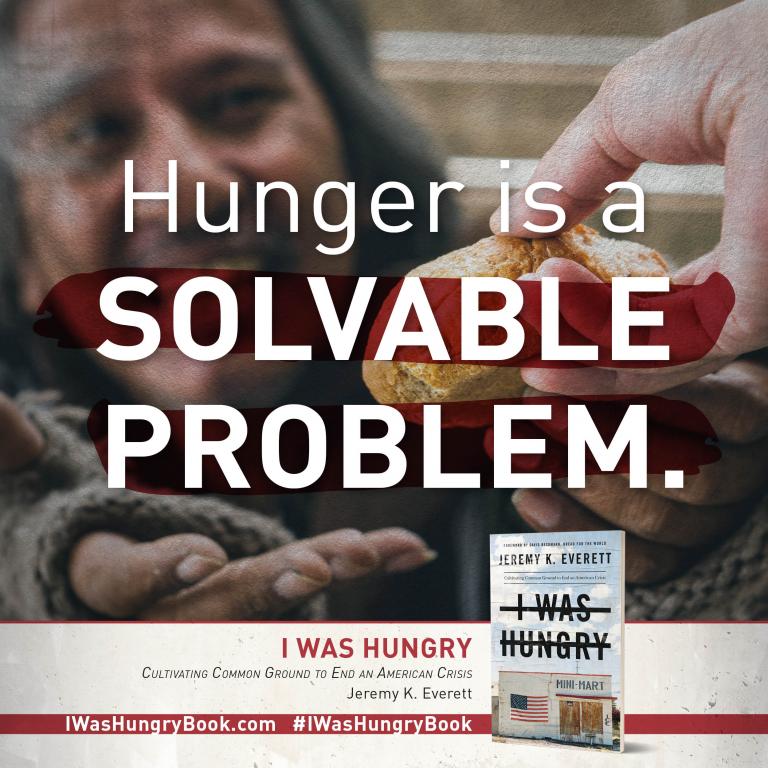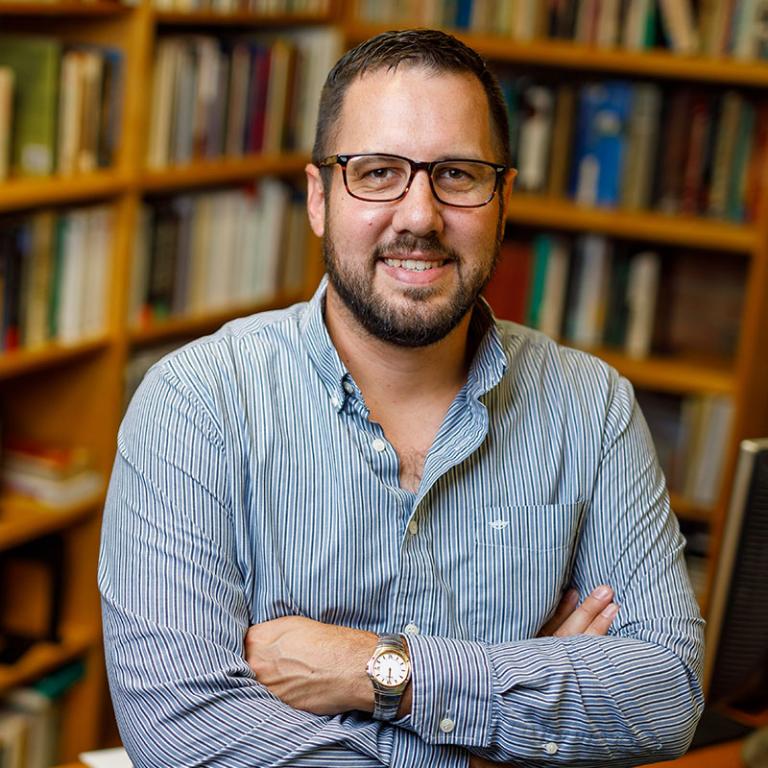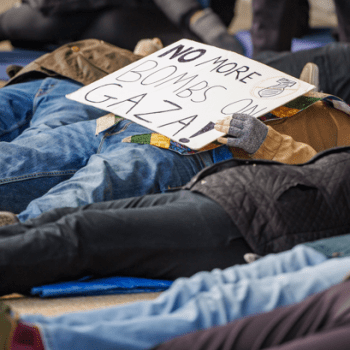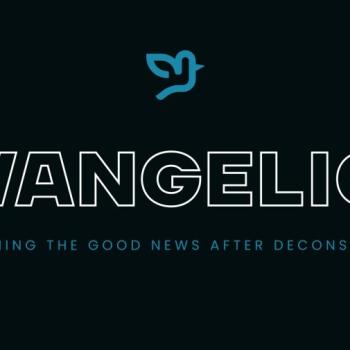While studying at Baylor University, I had the pleasure of meeting and befriending fellow Baylor Bear and Wacoan, Jeremy Everett. Jeremy is the founder and director of the Texas Hunger Initiative, a project devoted to ending hunger through policy, education, research, community organizing, and community development. He’s a National Commission on Hunger congressional appointee who has testified before congress on how to provide evidence-based solutions for the Supplemental Nutrition Assistance Program. He has worked for international community organizations as a teacher, religious leader, community organizer, fundraiser, and organic farmer. And, most recently, he is author of the brand new book I Was Hungry: Cultivating Common Ground to End an American Crisis (Brazos, 2019).* While in Waco, I sat down with Jeremy at his THI office for an interview about his work and the genesis of his book. Below is part 1 of 3 of our interview (edited for length and clarity).
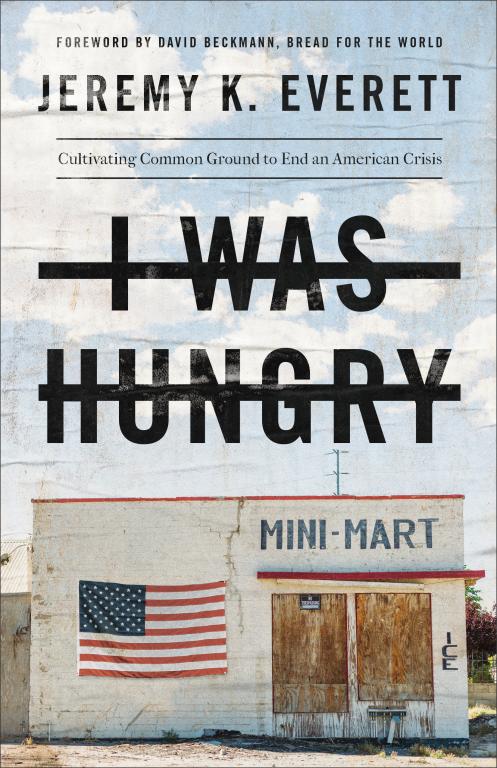
DC: Your book I Was Hungry tells the story of your work with Texas Hunger Initiative (THI). For those who haven’t read the book yet, could you explain in a nutshell what THI does?
JE: The Texas Hunger Initiative is all about coordinating local, state, and federal organizations that are working to solve hunger. Most people address hunger-related issues as if they were strictly local. However, after the train-wreck of a response to Hurricane Katrina, we realized the need for better coordination among various levels of government and the private sector.
The Texas Hunger Initiative was created in 2009 to be a research-informed community organizing project with organization on a federal, state, and local level to address the deep systemic causes of hunger and help more people gain access to three healthy meals seven days a week. Historically there has been bipartisan support for the issue of hunger, and so we can bring a variety of people—whether they are Catholics and Baptists or Republicans and Democrats or Baylor Bears and A&M Aggies—around the table to talk about the issue of hunger. And while we’re sitting at the table together, it doesn’t take long to realize that hunger is merely an aspect of poverty. By gathering diverse people to address hunger, we take the first step toward working together to address poverty.
DC: Texas is not necessarily known as the most progressive state, but fighting poverty is sometimes considered a more “progressive” cause. How has the work of THI been received here in the state of Texas?
JE: It’s been received well. A number of us who work with THI are from Texas or from southern conservative states, and we really do believe that people on the local level are what former President George W. Bush called “compassionate conservatives.” They want to do something in their communities. Oftentimes they are volunteering through their congregations. They recognize that addressing hunger and poverty is a part of their faith perspective, but they are uneasy when the federal government tells them how to do it.
It has been important for us to learn and speak the language of the people but also to let the federal and state government understand that, while they do need a seat at the table, that seat must be alongside the local community because people at the local level are closer to the problem. Those are the voices that we need to elevate, particularly those who are living in poverty. But no one sector is strong enough to address the issue on its own. Any time the church says, “We want to address hunger by ourselves,” I point to the reality that in the United States less than 3% of the needed food for food insecure families or families that are at risk for hunger is provided by the charitable sector.
DC: What led you to the realization that hunger couldn’t just be a local issue?
JE: I was doing inner city community development in San Antonio, and we had taken a Mission Center and turned it into a little coffee shop business that was able to leverage some other businesses to come into the neighborhood and help with underemployment. But we had over a 150,000 low-income residents in the neighborhood. While the fifty to one hundred jobs that were created through our economic development efforts represented millions of dollars, that was only a drop in the bucket. While I was in San Antonio, the agency that I was employed by got asked by Homeland Security to develop medical special needs shelters to respond to Hurricane Katrina. What they identified is that there are certain people—people suffering from mental health problems or mothers with infants—who cannot be in a general population shelter with thousands of other people. And so we had smaller shelters all over the city of San Antonio, largely in church gymnasiums with room for around 150 to 250 people.
But the response to Katrina, as we all remember, was an epic train wreck. The congregations, the non-profits, the corporate sector, and the local, state, and federal government were all on different pages. Afterward, Homeland Security began to organize a more coordinated federal, state, and local response to disasters. We were all trained together; all of these different sectors had to learn to speak the same language. We learned a new chain of command and a whole new language of “federal government speak.” (It was all acronyms all the time.) Largely, what we did was organize the resources we currently have.
Fast forward two years, and our response to Hurricanes Gustav and Ike were tremendously different. The shelters we operated had teams of nurses available to us. We had a makeshift ICU in one of the shelters that I ran with a generator and backup generator in case we lost power. We had a full pharmacy in every shelter. We had pharmacists with full pharmacies and doctors in every shelter so we could make sure we were adequately taking care of the people. We had MOUs with airplane, helicopter, and bus companies so that we could get people out of harm’s way as fast as possible as well as have a plan to get people back home. Part of that plan required getting grocery stores open before we sent anyone home because they wouldn’t have anything to eat or drink when they got there. We did all that planning in just a few short years, and it made a tremendous difference. We didn’t put more money into it as a nation; we just organized the resources that we had. THI began out of the realization that the model we used during Gustav and Ike could work for sustained engagement simply by turning that system on its side so that everyone has an equal seat at the table rather than having the federal government solely in charge.
DC: You learned to speak the language of the federal government, but you also brought to the table the language of the seminary. How has your theological training impacted the work that you do?
JE: I had my what I call my Franciscan conversion experience when I was in college studying to be a pastor like many other family members and I came across the story of St. Francis and felt compelled to work on the issue of poverty. I didn’t know what that looked like when I entered seminary, but while in seminary I moved into the inner-city neighborhood and learned the language of “incarnational organizing” that had been popularized by people like John Perkins and the Christian Community Development Association. That made sense to me—the idea of immersing myself in the realities of people experiencing poverty.
Around that same time, I had an opportunity to meet Gustavo Gutiérrez, the father of liberation theology, when one of my professors invited him to campus. At a dinner at the professor’s house, everyone was peppering Father Gutiérrez with questions, but I didn’t have the nerve to speak up. Finally, as we moved from the kitchen to the living room, there was an opportunity where just he and I were walking together. So I asked him a question that had been on my mind for several years: “How do you have solidarity with the poor?” He looked up at me and responded, “Commit your life to their cause.” In order to commit to the cause of the hungry and poor, I’ve had to learn what it takes to address the underlying causes, to understand how money works, how the corporate sector works, how federal and state government works. These aren’t things you’re typically taught in seminary.
